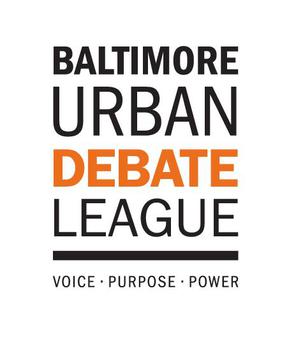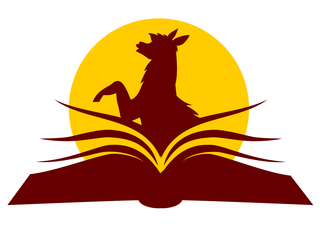
Debate is a process that involves formal discourse, discussion, and oral addresses on a particular topic or collection of topics, often with a moderator and an audience. In a debate, arguments are put forward for common opposing viewpoints. Debates have historically occurred in public meetings, academic institutions, debate halls, coffeehouses, competitions, and legislative assemblies. Debates have also been conducted for educational and recreational purposes, usually associated with educational establishments and debating societies. These debates emphasized logical consistency, factual accuracy, and emotional appeal to an audience. Modern forms of competitive debate also include rules for participants to discuss and decide upon the framework of the debate.
Lincoln–Douglas debate is a type of one-on-one competitive debate practiced mainly in the United States at the high school level. It is sometimes also called values debate because the format traditionally places a heavy emphasis on logic, ethical values, and philosophy.
Policy debate is an American form of debate competition in which teams of two usually advocate for and against a resolution that typically calls for policy change by the United States federal government. It is also referred to as cross-examination debate because of the 3-minute questioning period following each constructive speech. Evidence presentation is a crucial part of policy debate. The main argument being debated during a round is to change or not change the status quo. When a team explains why their solvency is greater than the opposition's, they compare advantages. One team’s job is to argue that the resolution— the statement that we should make some specific change to a national or international problem —is a good idea. Affirmative teams generally present a plan as a proposal for implementation of the resolution. On the other hand, the Negative teams present arguments against the implementation of the resolution. In a single round of debate competition, each person gives two speeches. The first speech each person gives is called a “constructive” speech, because it is the speech when the first speaker positively, without rebuttal that has not occurred, presents the basic arguments they will make throughout the debate. The second speech is called a “rebuttal”, because this is the speech were each person tries to rebut the arguments made by the other team, while using their own arguments to try to convince the judge to vote for their team. The Affirmative has to convince the judge to vote for the resolution, while the Negative has to convince the judge the Negative's position is a better idea.
The American Parliamentary Debate Association (APDA) is the oldest intercollegiate parliamentary debating association in the United States. APDA sponsors over 50 tournaments a year, all in a parliamentary format, as well as a national championship in late April. It also administers the North American Debating Championship with the Canadian University Society for Intercollegiate Debate (CUSID) every year in January. Although it is mainly funded by its member universities, APDA is an entirely student-run organization.

The Alabama School of Mathematics and Science (ASMS) is a public residential high school in the Midtown neighborhood of Mobile, Alabama. ASMS is a member of the National Consortium of Secondary STEM Schools (NCSSS). It graduated its first class in 1993.

The College Preparatory School is a four-year private non-residential high school in Oakland, California most known for its placement rates into elite colleges and its speech and debate program. The school's motto is Mens Conscia Recti, a Latin phrase adapted from Virgil's Aeneid that means "a mind aware of what is right".

A summer camp or sleepaway camp is a supervised program for children conducted during the summer months in some countries. Children and adolescents who attend summer camps are known as campers. Summer school is usually a part of the academic curriculum for a student to make up work not accomplished during the academic year.
The World Schools Debating Championships (WSDC) is an annual English-language debating tournament for high school-level teams representing different nations.
Parliamentary debate is an academic debate event. Many university-level institutions in English-speaking nations sponsor parliamentary debate teams. In addition the format is currently spreading to the high school level. Despite the name, the parli is not related to debate in governmental parliaments beyond formal speaker titles such as "Opposition Leader" and "Prime Minister".
An urban debate league (UDL) is a group of high school policy debate teams from urban high schools in the United States. UDLs are generally located in large cities throughout the United States and work predominantly with minority students.
The American Legion Boys State and American Legion Auxiliary Girls State are summer leadership and citizenship programs for high school juniors, which focus on exploring the mechanics of American government and politics. The programs are sponsored by the American Legion (AL) and the American Legion Auxiliary (ALA) respectively. Boys and girls are usually nominated by their high school during their junior year. Boys and Girls State programs both began in 1937 and are held in each of the U.S. states, usually at a college within that state. There is also a coed Boys/Girls State session held in Washington, D.C. In general, male and female programs are held separately, but at least nine states—Georgia, Nebraska, Oregon, California, Louisiana, Massachusetts, Pennsylvania, Rhode Island, and Missouri—host Boys and Girls State on the same campus on the same week.
There are several venues of competition for policy debate in the United States.
Inter-collegiate policy debate is a form of speech competition involving two teams of two debaters from different colleges or universities based on a resolution phrased as something the United States federal government "should" do. Policy debate also exists as a high school activity, with a very similar format, but different leagues, tournaments, speech times, resolutions, and styles.
Inter-A is one of the options available to high school students in British Columbia, Canada. The program is based on developing leadership skills through co-operation, self-motivation and creativity, and is available to students in grades 8-12. Currently Inter-A is situated within Queen Elizabeth Secondary School which is part of School District 36 Surrey. It has a current student population of 134, with 9 teachers

The Baltimore Urban Debate League, is an American, non profit, urban debate league that aims to educate and mentor inner city middle school and high school students in the Baltimore, Maryland area.

The World Scholar’s Cup is an annual international academic program. More than 15,000 students from over 65 countries participate every year.
The HNUE High School for Gifted Students, commonly known as HNUE High School, is a public magnet school in Hanoi, Vietnam. The school was founded in 1966 as a national educational institution to nurture Vietnamese students who excelled at mathematics. HNUE High School is the second oldest magnet high school in Vietnam and one of the seven national-level high schools for the gifted.
The Delta Study is a CBSE syllabus high school in Kochi, India. Established in 1976, Delta Study has approximately 1000 students and 47 teachers.
This is a glossary of policy debate terms.

Competitive debate, also known as forensics or speech and debate, is an activity in which two or more people take positions on an issue and are judged on how well they defend those positions. The activity has been present in academic spaces in the United States since the colonial period. The practice, an import from British education, began as in-class exercises in which students would present arguments to their classmates about the nature of rhetoric. Over time, the nature of those conversations began to shift towards philosophical questions and current events, with Yale University being the first to allow students to defend any position on a topic they believed in. In the late nineteenth century, student-led literary societies began to compete with each other academically and often engaged in debates against each other. In 1906, the first intercollegiate debate league, Delta Sigma Rho, was formed, followed by several others. Competitive debate expanded to the secondary school level in 1920 with the founding of the National Speech and Debate Association, which grew to over 300,000 members by 1969. Technological advances such as the accessibility of personal computers in the 1990s and 2000s has led to debate cases becoming more complex and to evidence being more accessible. Competitors and coaches have made efforts to reduce discrimination in the debate community by introducing new arguments and recruiting debaters from underprivileged communities.






